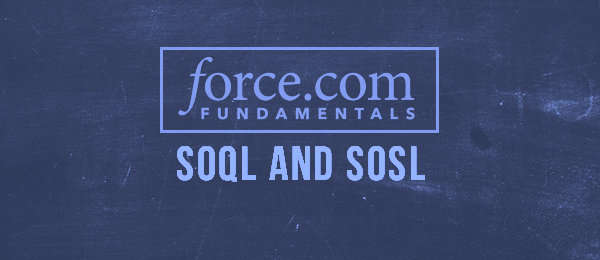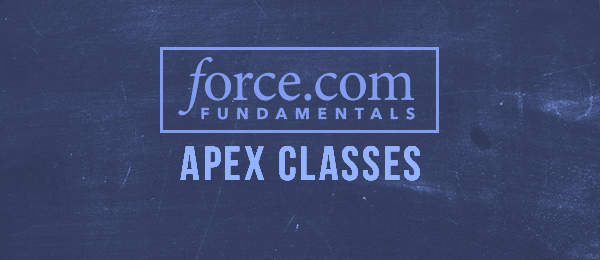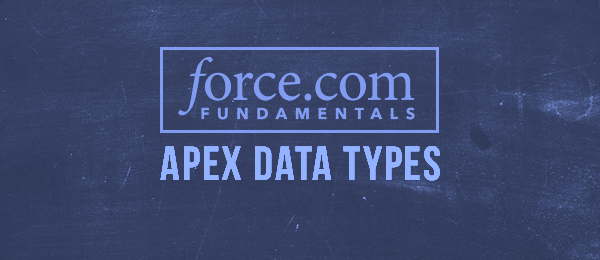SOQL (Salesforce Object Query Language) Use SOQL to construct simple but powerful query strings in the queryString parameter in the query() call, in Apex statements, in Visualforce controllers and getter methods, or in the Schema Explorer of the Force.com IDE SOQL statements are similar to the select statement in SQL SOQL statements are case-sensitive SOQL statements can be used in Apex and the Web Services API If the output of a SOQL statement is an “Consider and Index Filter” error, it means the statement is returning too many records in which case you need to use a WHERE clause to restrict … Read More
Force.com Platform Fundamentals: Apex Classes
Apex Classes: An apex class is a blueprint from which Objects are created Classes consist of attributes and methods Classes may contain other classes, known as inner classes (one level deep nested classes) Static attributes and methods can only be declared in a top-level class definition Exception class must be extended in case you want to create new extension classes Classes can be enabled or disabled for different profiles Syntax: private | public | global [virtual | abstract | with sharing | without sharing | (none)] Class className [implements interfaceName | (none)] [extends classOrInterfaceName | (none)] { // Class … Read More
Force.com Platform Fundamentals: Apex Data Types
Apex Data Types include: Primitive Enum sObject Collection Primitive Data Types: Include the following: Boolean Date Date/Time Time ID Integer Long Double Decimal String Blob Object Enum Data Types Is an abstract data type that allows you to store the values of a finite set of identifiers Defined using the keyword ‘enum’ Built-in enums viz. System.StatusCode returns API error codes Some enum methods: Values() – returns a list of values for the enum Name() – returns the name of the enum sObject Data Types Represents Objects (Standard and Custom) in Salesforce.com Can be either strongly typed or … Read More
Force.com Platform Fundamentals: Apex
What is Apex? Apex is a strongly typed, object-oriented programming language that allows developers to execute flow and transaction control statements on the Force.com platform server in conjunction with calls to the Force.com API. Using syntax that looks like Java and acts like database stored procedures, Apex enables developers to add business logic to most system events, including button clicks, related record updates, and Visualforce pages. Apex code can be initiated by Web service requests and from triggers on objects. Apex vs. Java They are both similar in syntax and notation, strongly typed and transactional. Both support OOP features viz. Encapsulation, Inheritance, Polymorphism. Apex runs in a Multi-Tenanted environment and is limited by … Read More
Finding Your Salesforce.com ORG Id
The problem is simple enough, where does your Org Id reside? You need it when interacting with Salesforce.com support both in opening cases and phone calls. To find your Salesforce.com instance Id, navigate to the following: Setup > Company Profile > Company Information Right Company Profile > Company Information Bottom of the right column
Spring ’14 Salesforce Delayed
Salesforce.com version Spring ’14 has been delayed for instance version NA7 in some cases. There have been multiple issues with the version, related to performance and functionality. You can expect to see the future release date announced no later than Thursday, January 16, 2014, at the following link: http://www.trust.salesforce.com/trust/maintenance/ The email from Salesforce: At salesforce.com, ensuring customer success through trusted system availability, performance, and reliability is our top priority. We’ve made the decision to postpone the rollout of Spring ’14 to your NA7 instance with these priorities in mind. We have identified open items related to the performance and functionality of the Spring … Read More
Salesforce.com Code Optimization
Rule #1: When developing custom Apex code in Salesforce.com, it is not enough to simply create a working trigger to fit your specific scenario, you must also take into consideration bulk data loading. If your trigger cannot handle loading multiple records, you will hit the error [message_box title=”Error:” color=”red”]System.LimitException: Too many SOQL queries: 101[/message_box] This error is typically caused by having a SOQL query within a for loop. To remedy this, you must add your SOQL query before your for loop. 1 2 3 4 5 6 7 8 9 10 11 12 13 14 15 16 17 18 Set<Id> projIds … Read More
Salesforce1 Glimpse
The next big thing to come to the Salesforce.com platform is Salesforce1. Here’s a glimpse of what’s in store for the next release: Salesforce1 is focusing on mobile driven development, allowing for 10 times as many APIs for apps. Beginning in March, the Chatter App will become the main interface users interact with while working in Salesforce.com. App development is going to be more flexible, including a Private App Exchange where developers can manage private applications. Admins will also have the capability to manage and distribute apps from the mobile platform. They can create apps that are business process oriented; … Read More







